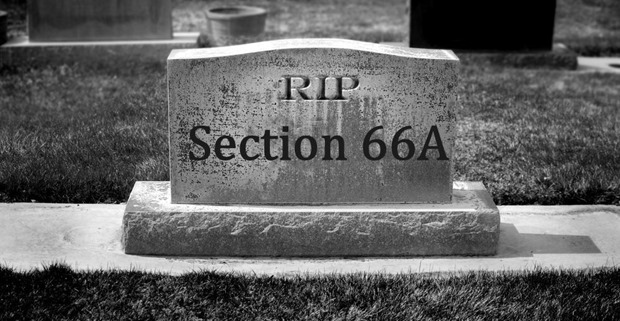RIP Section 66A, Supreme Court Terms It Unconstitutional. Long Live Free Speech

Slowly, but gradually, a scenario was developing in India where online citizens were becoming afraid of sharing their opinions and views. People were being arrested due to Facebook posts and blogs, simply because their world view was different from the politician’s or police’s worldview.
In a landmark decision made by Supreme Court today, Section 66A of Information Technology Act, which was used to arrest people for sharing content online, has been scraped and termed as “unconstitutional” by the apex body.
Several victims of this draconian law had been subjected to torture and arrests in the last few years, and they had petitioned their case in the Supreme Court, challenging it’s operative. The first PIL was filed by Shreya Singhal, after two young girls were arrested by Mumbai police in 2012 for posting critical comments on Shiv Sena supremo Bal Thackeray’s death. After that several NGOs, individuals and writers had joined the movement.
A bench of justices J. Chelameswar and R.F. Nariman from Supreme Court had reserved their judgment on February 26th and announced it today morning.
Countering terms such as “offensive content”, the bench said, “what is grossly offensive to you, may not be grossly offensive to me and it is a vague term.. Highly trained judicial minds (judges of the UK courts) came to different conclusions by using the same test applied to judge as to what is grossly offensive and what is offensive,”
The bench observed that Section 66A directly conflicts with the Right to Freedom of Speech and Expression, which is one of the most important pillars of our democracy and constitution. They said that people have a right to know, and no law should be used to stop that.
As Section 66A is violating Article 19(1)(a), not saved by Article 19(2), hence its unconstitutional and has been removed henceforth.
As per the ruling, any online content can be blocked or action can be taken against the creator of that content, in three cases: The content can create communal disturbance, social disorder or affect India’s relationship with other countries.
What Section 66A Said
As per Section 66A of Information Technology Act, “Any person who sends by any means of a computer resource any information that is grossly offensive or has a menacing character; or any information which he knows to be false, but for the purpose of causing annoyance, inconvenience, danger, obstruction, insult shall be punishable with imprisonment for a term which may extend to three years and with fine.”
Here are some cases where police abused this law to arrest people:
- Aseem Trivedi, Cartoonist, who was arrested in 2012 for mocking Parliament and politicians using cartoons
- Palghar girls from Mumbai were arrested in 2012 for posting their critical views on the deal of Bal Thackeray
- Professors from West Bengal were arrested for sharing cartoons mocking Mamta Banerjee, CM of West Bengal
- Air India employees were arrested in 2013 for sharing jokes on Indian politicians
- A Pondicherry businessman was arrested for sharing jokes on the son of P. Chidambaram
- CPI (M) worker from Kerala was arrested for posting online jokes on PM Modi
- A ship building professional from Goa was arrested for sharing some jokes on Indian politicians
- Class 11th student from UP was recently arrested for sharing his comments on hate speech delivered by UP Minister Azam Khan. Instead of arresting Azam Khan for spreading hatred, police arrested this 11th class student for his views.
We congratulate the Supreme Court for restoring our faith in the Indian democracy and to support Free Speech.
[Image Source: Shutterstock.com]

[…] Some experts are stating that this protocol is an indirect way to implement Section 66A, which was recently quashed by Supreme Court. […]
[…] a recent ruling by Supreme Court, where it termed Section 66A as “unconstitutional”, the court had informed that all orders pertaining to URL blockings should be written and saved for […]
[…] In a landmark decision made by Supreme Court last week, Section 66A of Information Technology Act, which was used to arrest people for sharing content online, has been scraped and termed as “unconstitutional” by the apex body. […]
yes. supreme court restored the faith. free speech is the most important entity of democracy